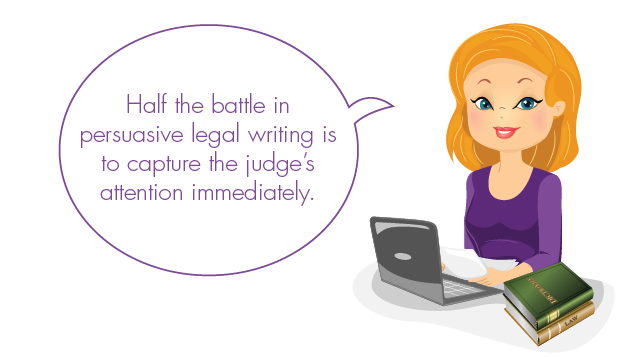Well-trained journalists learn a critical commandment early in their careers: never start writing until you know the story. Or, as novelist John Irving put it in Writers on Writing, “Never start writing until you know … as much of the story as you can possibly know, if not the whole story—before you commit yourself to the first paragraph … before you fall in love with the first sentence, not to mention your first chapter.”
In all forms of writing, it is best not to start the composition before determining the points from start to finish, and, most importantly, formulating the main issue.
Too often, attorneys draft the first section of a brief—with some idea of what it should address—without having figured out the core of their argument. They end up producing a piece of writing that dances around the main point—failing to set forth each component and show the logical links between them.

An exercise in non-linear outlining, or creating a “whirlybird” outline, as we discussed in the October column, should help in identifying the main issue and crux of the argument. Think through the case. Make sure you understand the issues. Try explaining them to a friend or colleague to develop a clear formulation before drafting them out.
To avoid writing a brief where the issues come as an afterthought, legal writing experts advise writing the issues “either just before or after you write the point headings.” (The Winning Brief, 3rd Ed.) Spend some time on them. Work to “perfect” them before writing any other parts of the brief.
In drafting the main issue, state the question clearly. Don’t make the court guess what it must decide. And get to the point quickly—meaning, phrase it in a way that makes for fast comprehension. Legal writing expert Garner says, “Every brief should make its primary point within 90 seconds.” (The Winning Brief, 3rd Ed.) The judge shouldn’t have to read past the first page to get the basic question in the case, the advocate’s stand on it, her answer to it, and the reasons for her answer.
Half the battle in persuasive legal writing is to capture the judge’s attention immediately. Do so by deftly defining the problem at the onset. Don’t try to do it in one sentence. Follow a premise-to-premise question form, work in enough facts to give it some flesh, and draft it in a way that allows for only one answer, e.g., the following example from The Winning Brief:
[A]ppellate courts may hear and rule on final orders only. Summary-judgment orders granting foreclosure are not considered final orders. [Name of appellant] has appealed the trial court’s grant of summary judgment on [name of bank]’s foreclosure count. Is that appeal properly before this Court?
The answer, of course, can only be “no.”
Savannah Blackwell is a former news reporter who covered government and politics for more than a decade, mostly in San Francisco. She became a licensed California attorney in 2010 and specializes in legal research and writing. She can be reached at savannah.blackwell@gmail.com. Follow her on Twitter at @SavannahBinSF.




